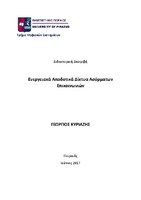Ενεργειακά αποδοτικά δίκτυα ασύρματων επικοινωνιών
Energy - efficient wireless communication networks

View/
Keywords
Ενεργειακά αποδοτικά δίκτυα ; Ασύρματη επικοινωνία ; Σχεδιασμός δικτύων κινητής ; Βελτιστοποίηση δικτύων κινητής ; Πράσινες τηλεπικοινωνίες ; Energy efficiency ; Network design ; Cellular networks ; Green radio communications ; Wireless communications ; Mobile optimization schemesAbstract
In wireless communication networks, with a full redesign in structure, operation and resources’ distribution at all levels of operation of this very complex mechanism, a significant amount of the consumed energy can be saved. Proper decision-exchange and support infrastructures, which will provide to the network management services the ability to meet the ever-changing needs and conditions of the environment, are considered as necessary, in order to achieve a high degree of energy efficiency optimization in wireless broadband communications.
This PhD Dissertation focuses on energy-efficient operation of one of the most common wireless access technologies, namely mobile/cellular communications. We focused on the wireless access points’ operation, which consume up to 80% of the total energy required by an operational wireless mobile network. We introduced new operational, transmission and traffic load servicing profiles in the set of wireless access points, aiming at the higher reduction of their energy consumption, while maintaining and monitoring the level of services offered to the end user. From a theoretical perspective, we classified this particular energy aware model into the category of the capacitated facility location problems, which are NP-hard. We applied exhaustive techniques for estimating the upper bound in each of the mobile network’s system models we examined, and we formulated the corresponding power consumption optimization problems. We examined a variety of different parameters and variations, such as: a) homogeneous and heterogeneous topology models, b) different radio access techniques, c) static users and user mobility patterns d) variety of offered services, as well as and e) application of backhaul models, and introduced energy-efficient heuristic schemes capable of finding the optimal solution from a power consumption perspective, per snapshot and/or per daily operation of a wireless communication network, while maintaining the quality of services at the desired levels.


